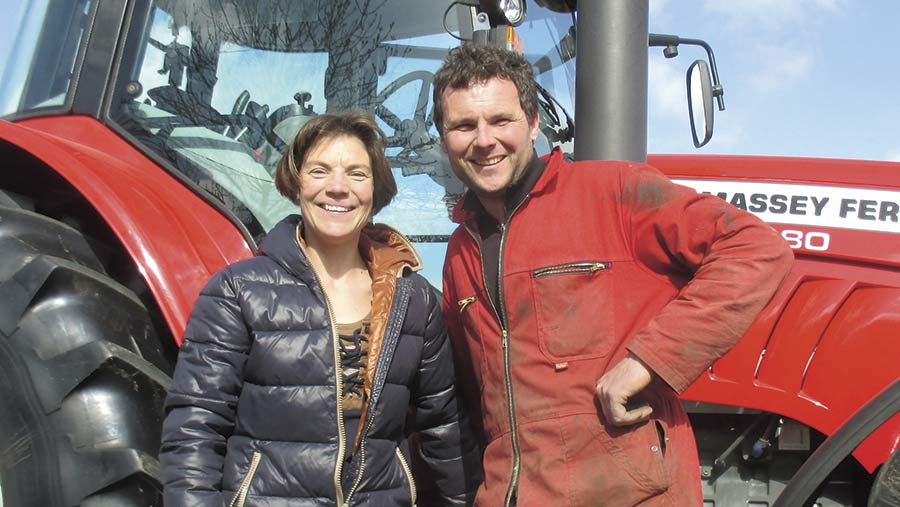What’s it like to be a farmer in the Netherlands?
Continuing our series, A View from Here, where we find out what it’s like to farm in other countries, we visit an arable farm in The Netherlands.
Carolien and husband Peter van de Kreeke farm 50ha with potatoes, sugar beet, wheat, grass for seed and chicory near Middelburg in the south-west of the country.
They also own a farm campsite with 25 spaces plus two chalets. Carolien answers our questions about farming in The Netherlands.
How involved are you with the farm?
Very much so. Living and working here is my way of life and I enjoy every day. Even though my husband, Peter, is responsible for the crops and I run the campsite, we discuss work together as much as possible. During harvest, I drive the tractors. Also, I am responsible for the accounting work.
See also: Farming in Canada: ‘Snow drifts as tall as tree rows’

Carolien and Peter van de Kreeke
How poor or prosperous are farming families in your country?
Most earn an average income. Dairy farming is poor at present; crops vary greatly season to season. e sometimes say: “Work hard, earn little.” But we really appreciate the way of life.
What’s the best thing about living on a farm?
The space – owning a large plot size and the space in our barns. We also have freedom and the ability to make our own choices. Also, the tranquility – it’s such a nice, quiet place to live.
Then there’s the nature around us, with hares playing on our land and the beautiful sunrises. We also enjoy seeing the changing seasons and weather – from bright sunshine to bitter cold snow.
What’s the worst thing about living on a farm?
The high seasonal workload, when our days are completely filled – especially the limited quality time we have with our children in these periods.
During their summer holidays, the time we get to spend together at the farm or visiting somewhere else is limited.
What makes it challenging is that the timing of these busy periods can be difficult to predict, so one needs to have great flexibility to cope with unexpected situations.
What’s the single biggest challenge farmers face where you are?
Dealing with regulations. In the Netherlands, many laws and regulations exist which do not benefit farm businesses. The rules surrounding fertilisers, for example, have become much more strict, resulting in substantial depletion of the soil – and this is fundamental to our ability to produce crops.
An additional challenge is the image of farmers, which is occasionally not the most positive. We are sometimes seen as people who harm the natural environment and (too) frequently use pesticides, but this is not a fair portrayal of us.
We have many opportunities to create a positive image for farming in the Netherlands, but as a profession and as individuals we could definitely do better in this respect.
Meanwhile, the weather has always been a challenge, but climate changes and mechanisation have made this issue even more complex.
What makes you happy?
The arrival of spring. The winter is rather quiet, with fewer activities on the land and the campsite closed. In the spring this changes, everything gets going – we enjoy working on the land again and welcoming the first visitors to the site.
What makes you angry?
The lack of control we have over the prices we get, which is not dependent on the quality of what we grow, but instead on market forces.
Also of great concern are the high land values, with prices on average about €85,000/ha (£75,900/ha), which hampers the growth and development of farms.
Is there equality between the sexes in your country?
Yes, men and women have similar rights and job opportunities (although, in practice, working with machinery and tractors is often still done by men). At our farm, it is a true case of teamwork.
Is farming well supported by your government?
We have had a strong proliferation in regulations, resulting in an enormous amounts of business registration and reporting. The strict rules on pesticides are an example.
Then there is the detailed registration of campsite visitors – not only the amount of people, but also the type of accommodation they use.
Tell us something about yourself not many people know
I also have a part-time position as communication manager at an organisation for wildlife and flora preservation, which is very rewarding, given my strong interest and respect for our beautiful landscapes.
Being a farmer as well, however, can sometimes provide me with a feeling of conflicted interests, since farmers and nature preservation organisations might not always share the same point of view.

